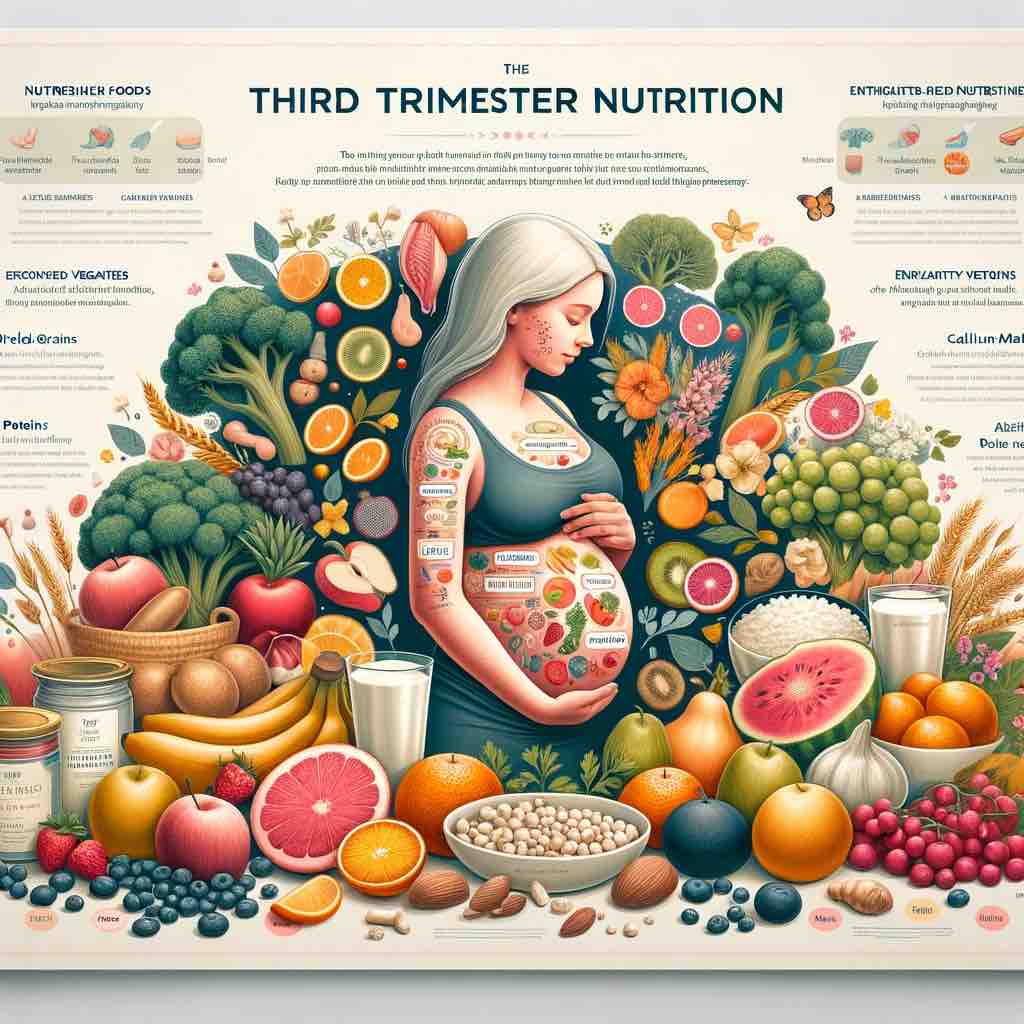
Introduction:
Welcome to the journey of motherhood, a time filled with wonder, anticipation, and a whole lot of questions, especially about what to eat. Among the myriad of dietary advice for expectant mothers, the role of fruits often takes center stage. But with so much conflicting information, it can be challenging to discern what’s best for you and your growing baby. That’s where we step in.
In this comprehensive guide, we’ll dive deep into the colorful world of fruits during pregnancy. From the luscious sweetness of strawberries to the exotic intrigue of soursop, fruits are not just a palette of delightful flavors; they’re a mosaic of nutrients, each with its own role in supporting your pregnancy journey.
But, as with all things in life, it’s not always straightforward. You might have heard whispers in the grapevine (pun intended!) about certain fruits being off-limits during pregnancy or certain myths that make you question your favorite fruit choices. We’re here to gently peel away these myths, layer by layer, and reveal the juicy truth.
Pregnancy is a time of growth, change, and nurturing. It’s a period where your body becomes a nurturing sanctuary for your little one. In each trimester, as your baby grows from the size of a sweet pea to a watermelon, your nutritional needs evolve too. This guide is designed to walk you through each stage with a week-by-week breakdown of what fruits can best support your pregnancy journey.
So, whether you’re in your first trimester, feeling the flutter of life in your second, or counting down the days in your third, let’s embark on this fruity adventure together. We promise to make it informative, engaging, and yes, even a bit fun – because nutrition during pregnancy should be joyful, not confusing.
Sit back, grab a fruit of your choice (we bet you’ll look at it with new eyes by the end of this guide), and let’s explore the vibrant world of fruits in pregnancy.
Certainly! The next section can delve into the importance of fruits during pregnancy, providing a detailed and engaging exploration. Here’s a suggested outline for this section:
Section: The Importance of Fruits in Pregnancy
Pregnancy is a symphony of growth, a time when your body orchestrates a delicate balance of nourishment to support the life developing within. In this melody, fruits play a harmonious role, not just as a source of natural sweetness, but as vital contributors to the health and well-being of both you and your baby.
Nature’s Multivitamins
Imagine fruits as nature’s multivitamins. They are packed with essential nutrients like vitamins, minerals, and antioxidants. Each fruit, with its unique nutritional profile, offers a range of benefits:
- Vitamin C in citrus fruits and strawberries boosts both your and your baby’s immune system.
- Folate, abundant in oranges and avocados, is critical in preventing neural tube defects during early pregnancy.
- Potassium, found in bananas and melons, helps maintain fluid and electrolyte balance in your cells.
These nutrients play a pivotal role not just in supporting the physical development of your baby but also in ensuring that your body can handle the demands of pregnancy.
Fiber: The Unsung Hero
One of the less glamorous, yet incredibly important aspects of fruits is their fiber content. Pregnancy can bring digestive discomforts like constipation and bloating. Here, fiber-rich fruits like apples, pears, and raspberries come to the rescue. They help maintain regular bowel movements and keep your digestive system healthy.
Natural Hydration
Hydration during pregnancy is crucial, and fruits can be a tasty way to increase your fluid intake. Water-rich fruits like watermelon and cucumber offer hydration, helping to prevent urinary tract infections, which are common during pregnancy.
Controlling Cravings and Weight Management
Pregnancy can come with cravings and an increased appetite. Fruits, with their natural sugars and fiber, provide a healthier alternative to processed snacks. They satisfy your sweet tooth while helping you manage weight gain within healthy limits.
Emotional Well-being
Let’s not forget the emotional aspect. The act of snacking on a juicy peach or a crisp apple can be a moment of mindfulness, a small but meaningful pause in your day that uplifts your mood and connects you with the simple pleasures of life.
A Rainbow of Choices
The variety of fruits available ensures that there’s something for every taste preference and nutritional need. Each color in fruits represents different antioxidants and phytochemicals:
- Red fruits like tomatoes and red grapes are rich in lycopene and anthocyanins.
- Yellow and orange fruits such as mangoes and apricots are loaded with beta-carotene and flavonoids.
- Green fruits like kiwi and green apples boast chlorophyll and lutein.
This rainbow of options not only makes your diet more enjoyable but also ensures a broad spectrum of nutrients for you and your growing baby.
A Word of Caution
While fruits are undeniably beneficial, they should be consumed mindfully. Not all fruits are created equal, especially in terms of sugar content and potential allergens. It’s also vital to consume fruits in their whole form rather than as juices, which can have high sugar levels and lack fiber.
Section: Fruit Safety During Pregnancy
Navigating through the do’s and don’ts of pregnancy eating can sometimes feel like walking through a dietary minefield. When it comes to fruits, while most are safe and beneficial, there are a few considerations to keep in mind to ensure both your safety and that of your baby.
Understanding the Myths and Facts
Myth: Some Fruits Can Cause Miscarriage
One of the most prevalent myths is that certain fruits can cause miscarriage or harm the fetus. Fruits like pineapple and papaya often find themselves at the center of these myths. The truth is, when consumed in reasonable amounts, these fruits are generally safe. The concern with pineapple arises from the enzyme bromelain, which is thought to soften the cervix and induce labor. However, you would need to consume large quantities for any potential effect. Similarly, papaya is only a concern if it’s unripe and consumed in large amounts, due to the latex it contains which can cause contractions.
Fact: Wash Fruits Thoroughly
The real concern with fruits during pregnancy is not the fruit itself, but the way it is prepared. Unwashed fruits can carry harmful bacteria like Listeria, Toxoplasma, and Salmonella. These can pose significant risks during pregnancy, leading to complications like premature delivery or even miscarriage. Always wash fruits thoroughly under running water, scrubbing where appropriate, and dry them before eating.
The Importance of Moderation
Sugar Content in Fruits
Fruits contain natural sugars, which, when consumed in excess, can lead to unwanted weight gain and imbalances in blood sugar levels. This is particularly crucial for expectant mothers with gestational diabetes or those at risk of developing it. Opt for fruits lower in sugar, like berries and kiwi, and balance them with protein-rich foods to stabilize blood sugar.
Portion Size Matters
It’s not just what you eat but how much you eat. Even with healthy choices like fruits, portion control is key. A good rule of thumb is to have fruits make up no more than a quarter of your plate at any meal.
High-Risk Fruits to Avoid or Limit
While most fruits are safe, there are a few exceptions:
- Unripe Papaya: As mentioned, unripe papaya contains latex, which can be harmful in large quantities.
- Grapes in Late Pregnancy: Some studies suggest that excessive consumption of grapes in late pregnancy may lead to complications, although this is not conclusively proven. If in doubt, consult with your healthcare provider.
- Exotic or Uncommon Fruits: If you’re not familiar with a fruit or it’s not commonly consumed in your area, do some research first or consult with a healthcare professional. Some exotic fruits might contain compounds that are not recommended during pregnancy.
Precautions with Pre-Cut and Packaged Fruits
Pre-cut and packaged fruits might seem convenient, but they come with an increased risk of bacterial growth. It’s always safer to buy fresh fruits and cut them yourself. If you do opt for pre-cut fruits, make sure they’re refrigerated and consumed quickly.
Fruits are an integral part of a healthy pregnancy diet, offering a plethora of nutrients essential for your baby’s growth and your well-being. By understanding and applying these safety guidelines, you can enjoy a variety of fruits without worry, ensuring a nutritious and enjoyable pregnancy experience.
Section: Week-by-Week Fruit Guide for Pregnancy
Embarking on the journey of pregnancy is like watching nature’s most miraculous process unfold. As each week passes, your baby develops new features and your body adapts to support this growth. Nutrition plays a pivotal role in this process, and fruits, with their rich array of nutrients, can be your allies at every step. Let’s explore a tailored fruit guide, week by week, to see how different fruits can benefit you and your baby through each trimester.
First Trimester: Weeks 1-12
Key Nutrients Focus: Folate, Vitamin C, Fiber
Week 1-4
- Avocados and Citrus Fruits: Rich in folate, essential for preventing neural tube defects in these early stages.
- Berries: High in antioxidants and vitamin C, which is crucial for the development of your baby’s skin and bones.
Week 5-8
- Bananas: Packed with vitamin B6, which can help alleviate morning sickness.
- Kiwis and Oranges: High vitamin C content for immunity and iron absorption.
Week 9-12
- Apples and Pears: Their fiber content helps with the digestive changes and constipation often experienced during early pregnancy.
Second Trimester: Weeks 13-26
Key Nutrients Focus: Vitamins A and C, Calcium, Magnesium
Week 13-16
- Mangoes and Apricots: Rich in vitamin A, crucial for the development of your baby’s organs.
- Cherries: Packed with antioxidants and can help improve your sleep quality.
Week 17-20
- Berries and Grapes: High in antioxidants and a good source of hydration.
- Oranges and Grapefruits: Continued emphasis on vitamin C for growth and development.
Week 21-26
- Melons and Peaches: High in water content and magnesium, which can help with those second-trimester leg cramps.
Third Trimester: Weeks 27-40
Key Nutrients Focus: Fiber, Potassium, Vitamin K
Week 27-30
- Raspberries and Blackberries: High in fiber, vitamin K, and antioxidants.
- Bananas: Their potassium content helps with pregnancy-related leg cramps and general muscle health.
Week 31-34
- Apples and Pears: Continuing with high fiber to prevent late-pregnancy constipation.
- Dates: Some studies suggest that eating dates in these weeks may facilitate cervical dilation and reduce the need for induced labor.
Week 35-40
- Watermelon and Cucumbers: Hydrating and refreshing, these fruits can help with swelling often experienced in the final weeks.
- Pineapple: Although it’s a myth that pineapple induces labor, it can help soften the cervix when you’re close to your due date.
This week-by-week guide is a general recommendation and should be tailored to individual dietary needs and medical advice. As your pregnancy progresses, listen to your body and adjust your fruit intake accordingly. Remember, variety is key, and consuming a rainbow of fruits ensures a broad spectrum of nutrients for a healthy pregnancy.
Section: Spotlight on Key Fruits During Pregnancy
In this section, we’ll take a closer look at some key fruits, discussing their specific benefits during pregnancy, and how they can be incorporated into your diet.
Watermelon: Hydration Powerhouse in the Third Trimester
Hydration and Swelling Reduction
- Benefits: Watermelon is over 90% water, making it an excellent choice for staying hydrated, especially in the third trimester when dehydration can be more common. Its high water content can also help reduce swelling in the feet and ankles.
- How to Include: Enjoy watermelon slices as a refreshing snack, add them to a fruit salad, or blend them into a hydrating smoothie.
Soursop: Exotic Fruit with a Nutritional Punch
Rich in Vitamins and Fiber
- Benefits: Soursop is a tropical fruit known for its unique flavor and rich nutrient profile, including vitamins C and B, and fiber.
- How to Include: It can be eaten raw, added to smoothies, or used in desserts. However, due to its exotic nature, it’s important to consume it in moderation and ensure it’s ripe and properly prepared.
Strawberries: Vitamin C Rich Delight for Second Trimester
Folate and Antioxidant Boost
- Benefits: Strawberries are a fantastic source of vitamin C and folate, essential nutrients in the second trimester for the baby’s development and maternal health.
- How to Include: Add them to your morning cereal, yogurt, or blend them into a nutritious smoothie.
Tamarind: Tangy Treat with a Nutrient Boost
Digestive Health and Nausea Relief
- Benefits: Tamarind is rich in magnesium and potassium, and it’s known for its laxative properties, which can help with pregnancy-related constipation. It’s also used in many cultures as a natural remedy for morning sickness.
- How to Include: Use it in moderation in sauces, chutneys, or as a flavor enhancer in various dishes.
Pineapple: Controversial yet Beneficial
Bromelain and Manganese
- Benefits: While it’s a myth that pineapple induces labor, it is rich in manganese and vitamin C, which are important for bone health and immunity.
- How to Include: Consume pineapple in moderation, preferably in the later stages of pregnancy. It can be eaten fresh, added to fruit salads, or blended into smoothies.
Grapes: Nutrient-Dense Snack for Pregnant Women
Vitamins, Antioxidants, and Energy
- Benefits: Grapes are rich in vitamins C and K, antioxidants, and provide a quick source of energy. They also contain resveratrol, a compound thought to support heart health.
- How to Include: Eat them raw as a snack or freeze them for a cool treat.
Exotic Fruits: Dragon Fruit, Kiwi, Guava
Unique Nutrients and Flavors
- Benefits: These exotic fruits offer a variety of nutrients. Dragon fruit is high in fiber and magnesium, kiwi is an excellent source of vitamin C, and guava is packed with folic acid.
- How to Include: Incorporate these fruits into your diet in moderation, enjoying them as part of a balanced diet.
A Note on Preparing and Consuming Fruits
When including these fruits in your diet, always ensure they are well-washed, ripe, and properly prepared. Be mindful of any allergies and consult with your healthcare provider if you have any concerns about specific fruits.
Section: Fruits to Avoid or Limit During Pregnancy
Pregnancy is a time of heightened awareness about what you eat, as certain foods can pose risks to you and your baby. While fruits are largely beneficial, there are some that should be approached with caution or avoided. This section will provide detailed insights into these fruits and the reasons behind the recommendations.
Unripe Papaya: A Risky Choice
Potential Risks
- Why to Avoid: Unripe papaya contains latex, which can cause uterine contractions, leading to early labor or complications. It also has high levels of papain, an enzyme that can hinder fetal development.
- Safe Alternatives: Ripe papaya is generally safe as the latex content decreases significantly. However, if you’re unsure, it’s best to avoid papaya altogether during pregnancy.
Grapes in Late Pregnancy: A Controversial Topic
Mixed Opinions and Potential Complications
- Why to Limit: Some studies suggest that grapes, especially in large quantities, can lead to complications like diarrhea, which can lead to dehydration. They are also a source of resveratrol, which, while beneficial in some aspects, can be problematic in high doses during pregnancy.
- How to Approach: If choosing to eat grapes, do so in moderation and preferably earlier in the pregnancy. Ensure they are washed thoroughly.
Exotic and Uncommon Fruits: Proceed with Caution
Unknown Factors and Allergens
- Why to Be Cautious: Exotic fruits like durian, star fruit, and ackee can be unfamiliar to many and may contain compounds that are not well-researched in terms of pregnancy safety. They also pose a higher risk of allergic reactions.
- How to Approach: If you’re curious about an exotic fruit, research it thoroughly or consult with a healthcare professional before consuming it.
High Glycemic Index Fruits: Managing Sugar Intake
Impact on Blood Sugar Levels
- Why to Limit: Fruits like watermelon, pineapple, and mangoes have a high glycemic index, which can cause spikes in blood sugar levels. This is particularly important for women with gestational diabetes or those at risk of developing it.
- How to Approach: Consume these fruits in smaller portions and balance them with other low-glycemic index foods.
Precautions with Pre-Cut and Packaged Fruits
Increased Risk of Contamination
- Why to Avoid: Pre-cut and packaged fruits are more susceptible to bacterial contamination like Listeria, which can be dangerous during pregnancy.
- How to Approach: Opt for fresh fruits and prepare them yourself to ensure cleanliness and reduce the risk of foodborne illnesses.
Allergic Reactions and Personal Sensitivities
Individual Responses to Fruits
- Why to Be Mindful: Pregnancy can alter your body’s reactions to certain foods. Fruits that you weren’t allergic to before could cause unexpected reactions.
- How to Approach: Be attentive to how your body responds to different fruits, especially if you notice any allergic symptoms or digestive issues.
While fruits are an essential part of a healthy pregnancy diet, it’s crucial to be aware of the ones that may pose risks. By understanding these guidelines and making informed choices, you can enjoy a variety of safe and nutritious fruits throughout your pregnancy.
Section: Preparing and Choosing Fruits During Pregnancy
In this segment, we delve into the practical aspects of fruit consumption during pregnancy – selecting the best fruits, ensuring their cleanliness, and preparing them in ways that preserve their nutritional integrity while safeguarding against potential health risks.
Selecting the Best Fruits
Freshness and Ripeness
- Key Considerations: Opt for fruits that are fresh and in season, as they are likely to have the highest nutrient content. The ripeness of a fruit not only affects its taste but also its nutritional value and digestibility.
- Tips for Selection: Look for fruits that are free from bruises, mold, and other signs of decay. Smell can be a good indicator of ripeness, especially for fruits like melons and pineapples.
Organic vs Conventional Fruits
Pesticide Concerns
- Understanding the Difference: Organic fruits are grown without synthetic pesticides and fertilizers, which can be a concern for some pregnant women. However, conventional fruits are also safe if handled correctly.
- Making the Choice: If budget permits, opt for organic, especially for fruits known to have higher pesticide residues (like strawberries and apples). If buying conventional, focus on thorough cleaning.
Washing and Cleaning Fruits
Reducing Contamination Risks
- Importance of Cleaning: Properly washing fruits is crucial to remove dirt, bacteria, and pesticide residues. This step is even more critical during pregnancy due to the increased risk of foodborne illnesses.
- Effective Cleaning Methods: Wash fruits under running water and use a brush for fruits with thicker skins. For fruits like berries, a gentle soak in water with a bit of vinegar can help remove residues and bacteria.
Cutting and Storing Fruits
Maintaining Nutritional Quality
- Best Practices: Cut fruits as close to eating time as possible to retain their nutrients, especially those that are sensitive to air exposure like apples and bananas.
- Storage Tips: Store cut fruits in the refrigerator in airtight containers. Use them within a couple of days to ensure freshness and minimize nutrient loss.
Pre-Cut and Packaged Fruits
Convenience vs Safety
- Risks Associated: While convenient, pre-cut fruits can harbor bacteria and lose some of their nutritional value.
- When to Choose: If you must opt for pre-cut fruits, ensure they are refrigerated and consumed as soon as possible. Check the ‘use by’ dates and ensure the packaging is intact.
Dried Fruits: A Nutrient-Dense Option
Benefits and Cautions
- Nutritional Advantages: Dried fruits are a good source of energy, fiber, and nutrients. They are handy for snacking and can be added to various dishes.
- Points of Caution: They are also high in sugar and can be calorie-dense, so moderation is key. Ensure they are free from added sugars and preservatives.
Incorporating Fruits into Your Diet
Creative and Healthy Ways
- Ideas for Enjoyment: Add fruits to your breakfast cereals, yogurts, or salads. Make smoothies or use fruits as toppings for pancakes and waffles. Experiment with fruit-based desserts that are lower in added sugars.
The way you select, clean, and prepare fruits can have a significant impact on their health benefits and safety during pregnancy. By following these guidelines, you can enjoy a variety of fruits in your diet, ensuring that you and your baby receive the essential nutrients for a healthy pregnancy journey.
Frequently Asked Questions (FAQs) About Fruits During Pregnancy
Pregnancy is a time filled with questions, especially regarding diet and nutrition. In this section, we tackle some of the most frequently asked questions about fruit consumption during pregnancy, providing thorough answers backed by nutritional science.
Q1: Can Eating Certain Fruits Increase the Chances of Conceiving a Boy or Girl?
Myth vs. Reality
- Answer: There is a popular myth that certain fruits can influence the gender of the baby. However, scientific evidence does not support this claim. The baby’s gender is determined by chromosomes and cannot be influenced by diet.
Q2: Is It Safe to Consume Fruit Juices During Pregnancy?
Fresh vs. Packaged Juices
- Answer: Freshly squeezed fruit juices can be consumed in moderation, provided they are pasteurized to eliminate harmful bacteria. However, packaged fruit juices often contain added sugars and lack fiber, making them less desirable. Always check for pasteurization, especially with juices like apple and orange.
Q3: How Much Fruit Should I Eat Daily During Pregnancy?
Recommended Daily Intake
- Answer: It’s generally recommended to have at least 2 servings of fruit per day during pregnancy. A serving could be a medium-sized apple, a cup of chopped fruit, or a small banana. It’s important to balance fruit intake with other food groups for a well-rounded diet.
Q4: Are There Any Fruits That Help with Morning Sickness?
Natural Remedies for Nausea
- Answer: Certain fruits like bananas, ginger, and citrus fruits are known to help alleviate morning sickness. Bananas are easy on the stomach, ginger can reduce nausea, and the fresh scent of citrus fruits like lemon may also provide relief.
Q5: Can Eating Fruits with High Water Content Reduce Edema (Swelling) During Pregnancy?
Hydration and Swelling
- Answer: Fruits high in water content, such as watermelon and cucumbers, can help with hydration, which may aid in reducing swelling (edema). However, they are not a cure-all solution. Adequate overall fluid intake and physical activity are also important.
Q6: Are Dried Fruits as Beneficial as Fresh Fruits During Pregnancy?
Comparing Nutrient Content
- Answer: Dried fruits are concentrated sources of nutrients and energy, making them beneficial. However, they are also high in sugar and calories. Fresh fruits are generally preferable due to their water content and lower calorie density. If consuming dried fruits, do so in moderation.
Q7: Can I Eat Frozen Fruits During Pregnancy?
Nutritional Value of Frozen Fruits
- Answer: Yes, frozen fruits are a good alternative to fresh fruits, especially if certain fruits are out of season. They are often frozen at peak ripeness, preserving their nutritional value. Just be sure to choose options without added sugars or syrups.
Q8: What Precautions Should I Take with Imported Fruits?
Safety of Imported Fruits
- Answer: With imported fruits, it’s important to ensure they are thoroughly washed and properly ripened. Be cautious with exotic fruits that you are not familiar with, as they might contain unfamiliar allergens or compounds.
We hope these answers provide clarity and help you make informed decisions about fruit consumption during your pregnancy. Remember, while fruits are an excellent source of nutrients, they should be part of a balanced diet tailored to your specific health needs and pregnancy stage.
Section: The Emotional and Psychological Benefits of Fruit Consumption During Pregnancy
Pregnancy is not just a physical journey; it’s an emotional and psychological voyage as well. The foods we eat can play a significant role in how we experience this journey. In this section, we’ll explore the often-overlooked emotional and psychological benefits of consuming fruits during pregnancy.
Sensory Experience and Emotional Well-being
The Joy of Eating
- Exploring the Senses: The act of eating fruits is a multisensory experience. The vibrant colors, fresh aromas, and diverse textures of fruits like berries, citrus, and melons can uplift your mood and enhance your overall sensory experience.
- Emotional Connection: Choosing, preparing, and eating fruits can become a mindful practice, fostering a moment of calm and connection with your body and your growing baby.
The Role of Fruits in Reducing Pregnancy-Related Stress
Natural Stress Relievers
- Nutritional Impact on Mood: Certain fruits, like oranges and strawberries, are rich in vitamin C, which has been linked to reducing stress. Bananas contain tryptophan, which helps in the production of serotonin, a mood-regulating neurotransmitter.
- The Psychological Effect of Healthy Choices: Making healthy food choices can also provide a sense of control and accomplishment, which is beneficial during the unpredictability of pregnancy.
Fruit Cravings and Emotional Fulfillment
Understanding and Embracing Cravings
- Navigating Cravings: Cravings during pregnancy are common and can be emotionally charged. Indulging in fruit cravings can be a guilt-free way of satisfying these urges while providing nutritional benefits.
- Cultural and Personal Significance: Sometimes cravings are tied to cultural or personal memories and experiences. Embracing these cravings can enhance emotional well-being and create a nostalgic or sentimental connection to one’s pregnancy.
Fruits as a Tool for Social Connection
Sharing and Bonding
- Community and Sharing: Sharing fruit-based dishes or snacks with family and friends can foster a sense of community and support, which is vital during pregnancy.
- Educational Aspect: Discussing fruit choices and nutritional benefits with others can be both educational and a way to deepen social bonds.
Fruits and Pregnancy Rituals
Traditional and Cultural Practices
- Cultural Significance: In many cultures, certain fruits are considered auspicious or are central to pregnancy rituals. Engaging in these traditions can provide a sense of belonging and continuity.
- Creating Personal Rituals: You can also create your own rituals with fruits, such as celebrating each trimester milestone with a special fruit dish, as a way to mark the progress of your pregnancy.
The emotional and psychological aspects of consuming fruits during pregnancy are as important as the physical nutritional benefits. By incorporating a variety of fruits into your diet, you not only nourish your body but also enrich your emotional experience, create lasting memories, and build deeper connections during this unique and transformative phase of life.
Section: Conclusion and Final Thoughts
As we wrap up our extensive guide on fruit consumption during pregnancy, it’s important to reflect on the journey we’ve taken together through the vibrant world of fruits. From understanding the nutritional benefits and safety precautions to embracing the emotional and psychological aspects, we’ve covered a wide array of topics, each contributing to a holistic view of how fruits can enhance your pregnancy experience.
Summarizing the Journey
Key Takeaways
- Nutritional Richness: We’ve seen how fruits, with their plethora of vitamins, minerals, and fiber, are essential for both the physical development of your baby and your own health.
- Safety and Moderation: The importance of consuming fruits safely – by choosing ripe, well-washed fruits and being aware of those to limit or avoid – cannot be overstated.
- Mindful Eating: We’ve also explored the sensory joys and emotional connections fruits can bring, highlighting the importance of mindful eating during this special time.
The Bigger Picture: A Balanced Diet
Integrating Fruits with Other Food Groups
- Holistic Nutrition: While fruits are a key component of prenatal nutrition, they are part of a larger picture that includes a variety of food groups. A balanced diet, combining fruits with vegetables, whole grains, lean proteins, and healthy fats, is crucial.
- Consultation with Healthcare Providers: Always remember that individual dietary needs can vary. Consulting with healthcare professionals for personalized advice is recommended, especially in cases of dietary restrictions or pregnancy complications.
Embracing the Pregnancy Journey
A Time of Growth and Change
- Celebrating Each Stage: Each stage of pregnancy brings its unique challenges and joys. Embracing these changes, including how your diet evolves, is part of the beautiful journey of motherhood.
- Building Memories and Traditions: Whether it’s satisfying a craving or creating new rituals with fruits, these moments can become cherished memories of your pregnancy.
Parting Words
Encouragement and Support
- As you continue on your pregnancy journey, remember that the choices you make, including what you eat, are part of a nurturing process for both you and your baby. Allow yourself to enjoy and explore the bounty of fruits nature offers, with the knowledge and insights you’ve gained.
Final Reminder
- A Journey of Discovery: Pregnancy is a journey of discovery, not just of motherhood but also of yourself. Through each fruit you taste and each choice you make, you’re nurturing a new life and strengthening your own. Embrace this journey with love, care, and joy.














